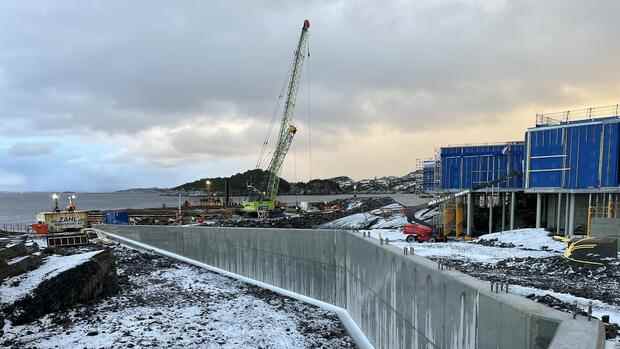A similar infrastructure for CCS technology is also to be set up in Germany.
(Photo: Klaus Stratmann, Handelsblatt)
Berlin Environmental groups and large parts of the Green Party have long resisted the so-called CCS process, but now it is moving up the political agenda: On Wednesday, a forum with representatives from politics, business and associations will start its work and look for ways to use the technology , with which carbon dioxide can be stored underground, also to be established in Germany.
CCS stands for Carbon Capture and Storage. The process makes it possible to manage CO2 emissions that cannot be avoided in certain industrial processes. The Federal Environment Agency puts the amount of these emissions from industry and waste and sewage management in Germany at 43 million tons a year. A total of 739 million tons of greenhouse gases were released in Germany in 2020.
The “CCS Forum” is now to develop concepts for building an infrastructure for the technology. Representatives of the Federal Ministry of Economics, led by Robert Habeck (Greens), will also sit at the table. Other players include companies such as BASF, Covestro and Heidelberg Cement, associations such as the BDI and the Steel Industry Association, and representatives from waste management and the paper industry.
In four working groups, the participants will deal with the technical requirements, the regulatory framework and the issues of costs and acceptance. The project is scheduled for three years.
Top jobs of the day
Find the best jobs now and
be notified by email.
Germany already has a long debate about CCS behind it. In April 2009, the then federal government passed a first draft for a CCS law. This would have made it possible to apply the technology on a large scale.
Population resisted CO2 storage
After the first corporate activities to store CO2 met with great resistance from the population because of fears of leaks and groundwater contamination, the federal government withdrew the law.
A new draft came into force in August 2012 after long debates. It restricts the technology to demonstration and pilot projects and limits the permissible storage volume considerably. In addition, the federal states have the option of excluding CO2 storage for their country.
The signs have since changed. A decade ago, the technology’s critics still argued that CCS primarily served the purpose of giving coal-fired power plants a chance of survival. The statutory phase-out of coal has invalidated this argument.
In the meantime, a rethink is taking place among environmentalists – and also among the Greens. The topic is already taken into account in the coalition agreement of the traffic light parties, although the SPD, Greens and FDP have managed to avoid the abbreviation “CCS”: “We are committed to the need for technical negative emissions and are developing a long-term strategy for dealing with the approximately five percent that are unavoidable Work out residual emissions,” it says.
>> Read here: “They accept reality” – The energy transition of the Greens
In August, Greens leader Ricarda Lang visited Norway, where she spent two days exclusively on the subject of CCS. Norway is one of the pioneers of technology. It has been used there since 1996. The country is currently in the process of setting up a CCS infrastructure that should be open to companies from all over Europe. Forum member Heidelberg Cement is one of the first companies to want to make use of it.
The driving force behind the “CCS Forum” is the Norwegian environmental protection organization Bellona, which has had its own representation in Germany since 2021. She initiated the platform and coordinates its work. “CCS must be considered across all sectors and is central to the future viability of Germany as a business location,” says Erika Bellmann, Managing Director of Bellona Germany. Arne Müller, project manager of the CCS Forum, says that the platform is intended to develop a common understanding of the role of CO2 storage on the way to climate neutrality in Germany.
>> Read here: What to do with the CO2? How Norway can help German industry with climate protection
In contrast to many German environmental protection organizations, Bellona promotes CCS as a contribution to climate protection. The organization wants to support all efforts that help to reduce CO2 emissions. In Norway, Bellona has been supporting CCS activities there for years. The Foundation is also involved in discussions around CCS in industry in the UK and the Netherlands.
More: This is how the construction of LNG terminals is progressing

